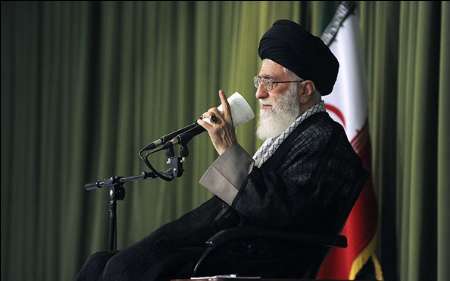The Supreme Leader Ayatollah Sayyed Ali Khamenei stressed on Wednesday that the Iranian negotiators in the nuclear talks should insist on Iran’s stances that have been announced earlier.
 The Supreme Leader of the Islamic Republic of Iran Grand Ayatollah Sayyed Ali Khamenei stressed on Wednesday that the Iranian negotiators in the nuclear talks with the P5+1 should insist on Iran's stances that have been announced earlier, expressing hope they could meet the country's interests.
The Supreme Leader of the Islamic Republic of Iran Grand Ayatollah Sayyed Ali Khamenei stressed on Wednesday that the Iranian negotiators in the nuclear talks with the P5+1 should insist on Iran's stances that have been announced earlier, expressing hope they could meet the country's interests.
During a meeting with Iranian Parliament Speaker Ali Larijani and parliamentarians in Tehran, Ayatollah Khamenei underlined that the Iranian negotiators are engaged in hard work and efforts.
The Supreme Leader pointed out that the nuclear issue is only a pretext to pressure Iran and even if this problem is resolved, the western powers would seek other excuses such as "human rights".
Ayatollah Khamenei called on the Iranian officials to rely on the country's domestic capabilities, and said, "If we boost production and use domestic potentialities, this will not only solve internal problems, but also facilitate settlement of foreign issues such as the nuclear one."
Earlier this month, his eminence dismissed the US war rhetoric against Iran as void, boastful remarks, but meantime, warned that Tehran would not negotiate under threat.
"It is not acceptable that the opposite side continues making threats simultaneous with the talks," the Leader said, addressing a public meeting with teachers here in Tehran.
He further noted the remarks made by two US officials -- one of them was US Secretary of State John Kerry -- in recent days who had alleged that military threats against Iran are still valid, and said, "Negotiation under the ghost of a threat is meaningless and the Iranian nation does not tolerate negotiation under the shadow of threat."
"First of all, you can't do a stupid thing," Ayatollah Khamenei said in response to the two US officials, and added, "Secondly, as I had already stated during the term of the former US president, the era of hit-and-run attacks is gone and the Iranian nation will not let go anyone intending to make an aggression" against it.
Meantime, he said the US needs the nuclear talks, at least, as much as Iran does, and pointed out that Iran is willing to put an end to the sanctions.
The Supreme Leader underlined that now everyone in Iran knows pretty well that the country's economic problems are not resolved through the removal of the sanctions, "rather resolving economic problems requires our own planning, will and ability, no matter the sanctions are in place or not".
"Of course, if the sanctions are removed, the economic problems could be solved more easily, but their resolution will be possible if the sanctions continue," he added.
After nine days of hard work in Lausanne, Switzerland, Iran and the Group 5+1 reached an understanding on April 2 which laid the ground for them to start drafting the final nuclear deal over Tehran's nuclear energy program ahead of a July 1 deadline.
Reading out a joint statement at a press conference with EU foreign policy chief Federica Mogherini in Lausanne on April 2, Zarif said according to the agreement, all the US, EU and UN Security Council sanctions against Iran would be lifted under the final deal.